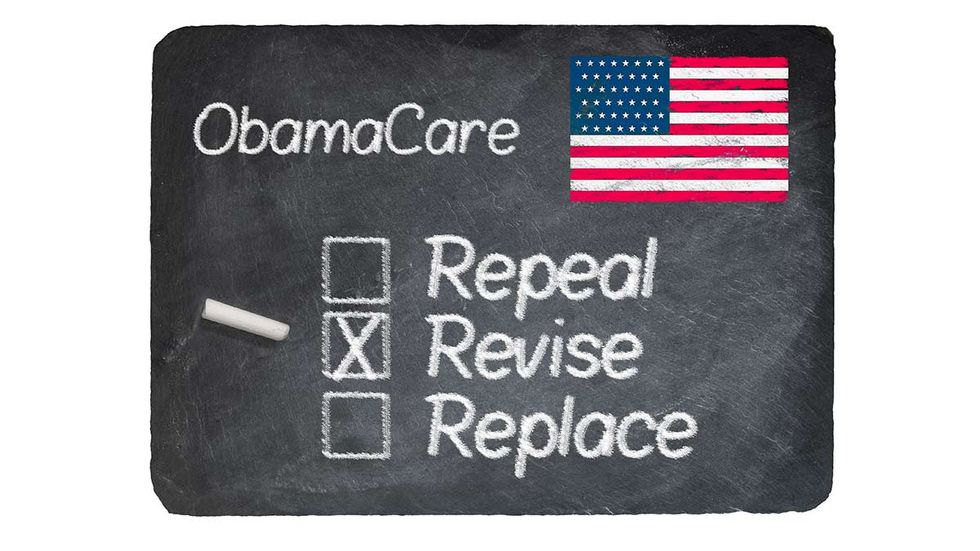
© 2024 Blaze Media LLC. All rights reserved.
The Senate will have a chance to vote on a bill that’s much closer to keeping Republicans’ promise to repeal Obamacare than the bills recently under consideration. But its chances of passage are not great — a reality that is far more cultural than it is purely political.
The Senate’s 2017 “repeal-replace” bill fell apart late Monday night after it lost the support of Sens. Mike Lee, R-Utah, and Jerry Moran, R-Kan. This occurred after Sen. John McCain’s medical absence had already postponed the vote until next week.
In the wake of Lee’s and Moran’s decision, Majority Leader Mitch McConnell announced that he would instead opt for an Obamacare repeal plan that would eliminate almost all of the 2010 health care law. Congress passed a similar bill in 2015; President Obama vetoed it.
But we shouldn’t hold our breath to see this bill pass. If support for the previous watered-down non-repeal is any indication, the new measure to be considered is likely to fail, between a Senate majority with several left-leaning Republicans and a Democrat minority that has shown a united front against all previous repeal efforts.
Why so many Republican lawmakers have refused to pass a bill they voted for literally dozens of times during the previous administration and promised on the campaign trail now that a Republican President could sign off on it has been puzzling and angering many both on and off Capitol Hill.
Some recent polling sheds a bit of light on the reason.
A new Washington Post/ABC poll shows that 43 percent of self-identified conservatives polled would prioritize medical insurance handouts from the government over tax cuts, Conservative Review’s Chris Pandolfo reported Monday.
This is a single poll taken in the midst of a roller coaster of a national policy debate. But it does help answer the million-dollar question of why GOP leadership is completely unwilling to follow through on their years-long promise to repeal the ACA and why so many in the Republican fold are bending over backwards to preserve the most onerous portions of the law.
Back in January, a Pew study found that a whopping 60 percent of those polled believe that health insurance is the government’s job, compared to 38 percent who answered in the negative.
There are more analysis and opinion pieces from conservative media about the failings of the most recent GOP proposal than one can shake a stick at.
Nevertheless, the effort forged on until it finally became clear that it would never pass. Big-government types in the Senate went the extra mile against their party’s campaign promises to force in less repeal, more entitlements, and a lot of government money thrown around to create something that Sen. Rand Paul described as more akin to a combination of the original law and the infamous bank bailouts of a decade ago.
One poll doesn’t tell the whole story, but it certainly tells a lot. When you have a sizeable minority of self-identified conservatives who think that preserving welfare programs is more important than limiting how much of someone’s property the government forcibly takes, it says a lot about how even self-identified conservatives relate to the state.
The situation is reminiscent of the ongoing debates about federal programs like Social Security and Medicare, where Republican voters’ frustrations with out-of-control D.C. spending are pitted against a seemingly insurmountable cultural mandate to preserve programs that are speeding off of a financial cliff.
And despite the efforts of many to point out what free-market alternatives would look like, how those would lower prices, drive innovation, and could develop their own means of covering pre-existing conditions, telling people to trust the market when so many have a greater trust in government is a recipe for failure.
As the late conservative new media pioneer Andrew Breitbart used to say, "Politics is downstream from culture," meaning that it’s foolish to expect a political outcome that is contrary to a cultural narrative.
Big-government culture will inevitably flow downhill to big-government politics. Conservatives must work upstream to change those poll numbers if they ever want true free-market health care to be a reality in the United States.
Want to leave a tip?
We answer to you. Help keep our content free of advertisers and big tech censorship by leaving a tip today.
Want to join the conversation?
Already a subscriber?
more stories
Sign up for the Blaze newsletter
By signing up, you agree to our Privacy Policy and Terms of Use, and agree to receive content that may sometimes include advertisements. You may opt out at any time.
© 2024 Blaze Media LLC. All rights reserved.
Get the stories that matter most delivered directly to your inbox.
By signing up, you agree to our Privacy Policy and Terms of Use, and agree to receive content that may sometimes include advertisements. You may opt out at any time.



